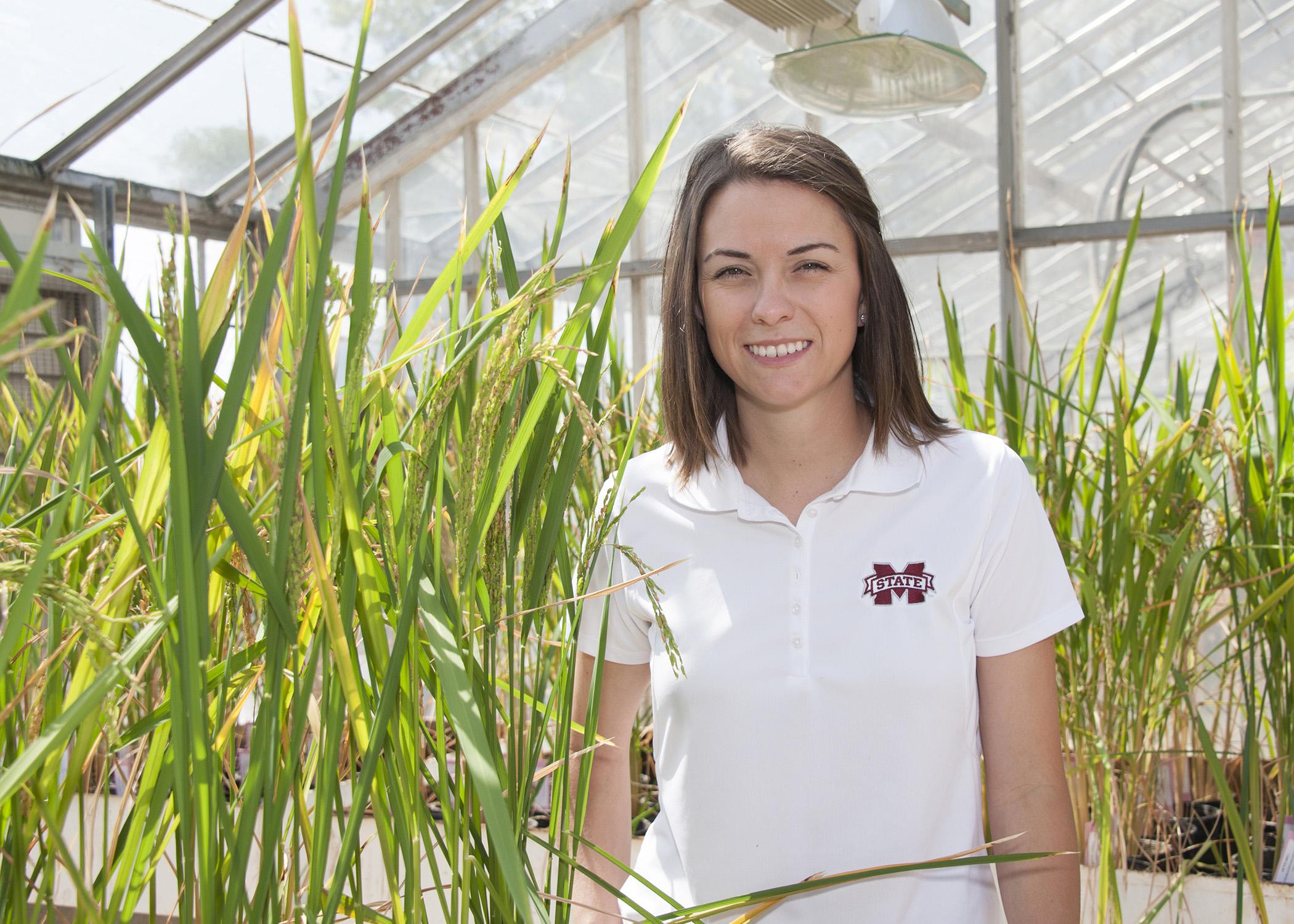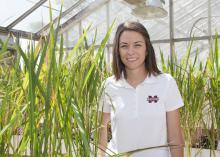Information Possibly Outdated
The information presented on this page was originally released on May 28, 2014. It may not be outdated, but please search our site for more current information. If you plan to quote or reference this information in a publication, please check with the Extension specialist or author before proceeding.
MSU research associate finds her field in rice
STONEVILLE – Jennifer Corbin is one of a kind.
A Mississippi State University research associate at the Delta Research and Extension Center, Corbin is the only female rice researcher at the Stoneville center and the most senior on her project.
In fact, she’s the station’s only female research associate in field crops.
Ag research isn’t even a field she ever imagined she would choose for her career.
“I planned to be a veterinarian,” Corbin said. “I lived outside a city of 70,000 people. I went to college at the University of Arkansas, and the programs there are geared toward food animal production.”
While in college, Corbin switched her major to agriculture business with plans to work in the poultry industry. But when the economy slowed down, she and her husband, Austin, started looking for jobs in other regions. They moved from Arkansas to Cleveland, Mississippi in the fall of 2009 for Austin’s job.
Once she arrived in the Mississippi Delta, Corbin started looking for work. She was hired to work with Tim Walker, then an associate agronomist with the Mississippi Agricultural and Forestry Experiment Station.
“Within six months, I started working on my master’s degree in agronomy,” Corbin said. “I discovered I really enjoy being outside, not doing the same thing every day. With this industry, every season brings something different -- planting, maintenance, harvest.”
Corbin specializes in the Clearfield 151 variety of rice.
“It’s high yielding, but it has a lot of problems with lodging,” she said. “If you drive past a field and see the rice laid over due to rain or wind, that’s lodging.”
Producers want to grow this variety because of the high yields, but lodging causes problems with harvesting and reduces milling quality, Corbin said.
“We’re working on ways to minimize lodging, trying to see if the plant can be managed through nitrogen, potassium and fungicide applications or plant growth regulators,” Corbin said.
Corbin said the environment she works in may not appeal to all women.
“You have to be aware of what you’re getting into when you work in an industry that is predominantly male,” she said. “Men and women are very different emotionally. I realize that I have to keep my emotions in check to a certain extent to be respected and taken seriously. As a female, it can be intimidating to be surrounded by men all the time, so I would say a certain level of confidence is also necessary.”
Walker, Corbin’s longtime supervisor, said she was respected by the staff because she worked as hard as everyone else.
“She’s not afraid of hard work. Rice is grown in hot, very humid and muddy conditions, and you have to be willing to get sweaty and muddy to work in it,” Walker said. “Jennifer understands and relates well to people who work in Southern agriculture, and if anyone on my predominantly male staff pushed or prodded her, she gave it right back. I enjoyed seeing the work dynamic between her and the other team members.”
Walker said Corbin was not afraid to ask questions.
“‘Why’ and ‘how’ are very important words for any scientist,” he said. “She followed her findings through to the development of more questions and hypotheses.”
Her strong work ethic and good character were evident in both the lab and the field, no matter what the challenges were.
“Not long after Jennifer decided to pursue her master’s degree, she became pregnant with her first child, and she gave birth to her second child during the summer of her last year of graduate research,” Walker said. “We had to force her to stop going to her research plots a few weeks before the baby was due because we started getting calls from farmers questioning why I would make a pregnant lady walk the rice fields.
“Needless to say, I was not making her do it; she was doing it on her own. She’s just that dedicated,” he said.



